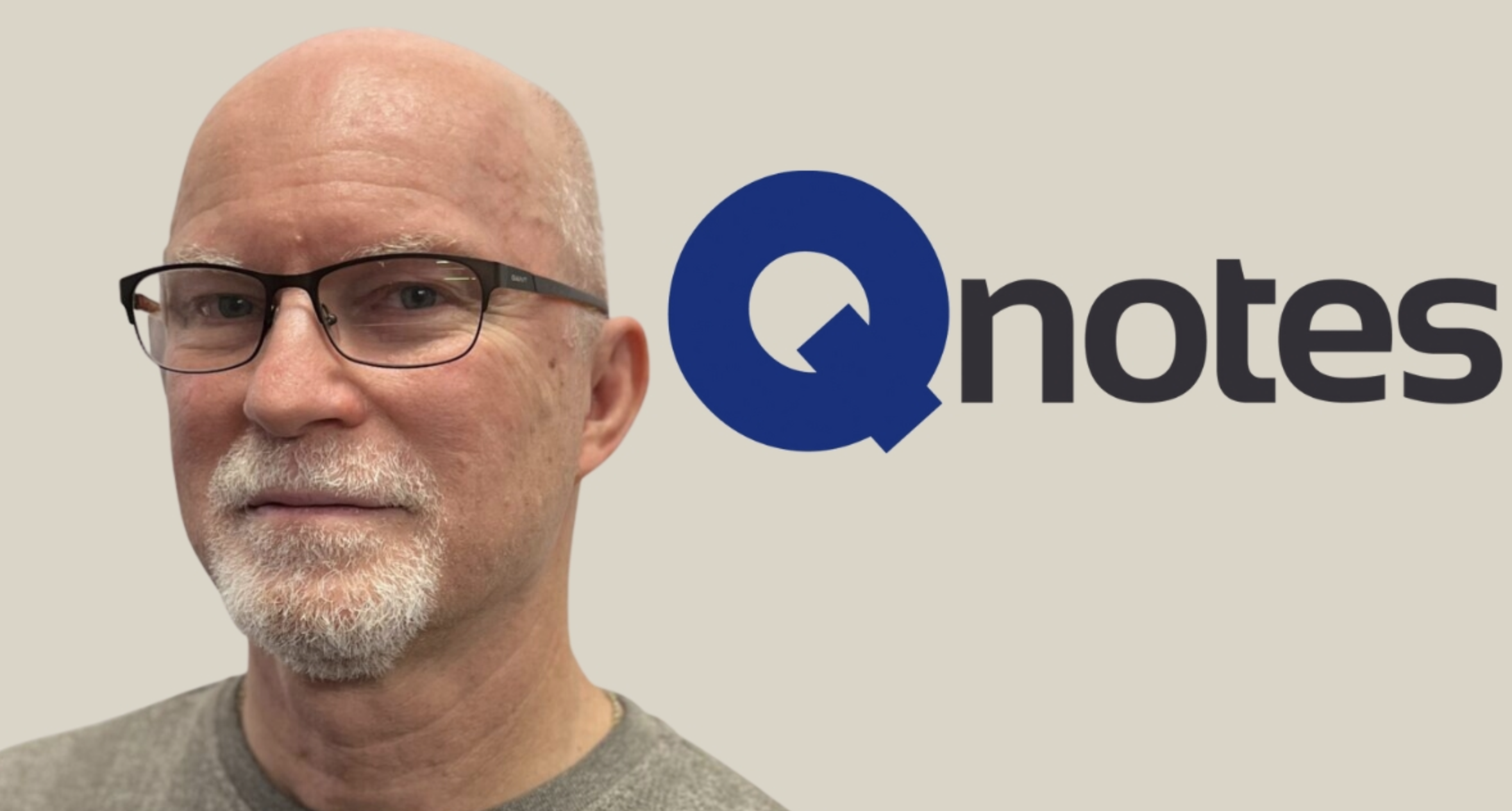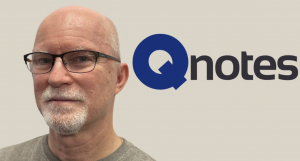
Qnotes publisher reflects on four decades of its mission to serve
by Catherine Komp for NCLocal, the NC Local News Workshop
(The following story was originally published in NC Local, by NC Local News Workshop. It then appeared in Qnotes in its July 21, 2023, issue. It appears here with permission.)
To wrap up Pride Month, NC Local wanted to take a closer look at the legacy and impact of Charlotte, N.C.-based Qnotes, one of the longest-running local LGBTQ news publications in the country. Over four decades, Qnotes has provided a space for LGBTQ journalists to cover vital issues, from the Supreme Court’s nomination of Robert Bork in 1989 to the historic marriage equality ruling in 2015 to the recent public and legislative attacks on the LGBTQ community. Qnotes also has a long record of elevating LGBTQ visibility by highlighting local artists, performers and other creators through its cultural and entertainment coverage.
More than 600 issues of Qnotes dating back to its first newsletters in 1983 are available to read through UNC’s North Carolina Digital Heritage Center.
Queen City Quordinators or QCQ started the newsletter (then called “Q-Notes”) to provide information on the group’s projects like the Gay/Lesbian Switchboard and Acceptance, a program that provided fellowship and educational opportunities. The newsletter offered plenty of ways to volunteer, from joining the Lambda Political Caucus to trying out for Charlotte’s first lesbian-themed play.
Qnotes was — and is — an essential way for the LGBTQ community to connect, find resources and celebrate progress. The December 1983 edition reflected on the past year: “New groups were formed; old ones were stabilized; a sense of collective identity and purpose began to emerge.”

It was a labor of love by the founders, which included QCQ president Robert Sheets; the late Don King, a local LGBTQ leader and journalist at the Charlotte Observer; and current publisher Jim Yarbrough, who started out as treasurer.
“We ran it as a nonprofit for several years, and then all of a sudden Don called me up one day, said, ‘Oh, by the way, there won’t be another Qnotes. I quit, I don’t have time to do it anymore,’” said Yarbrough. “And so three of us on the board said, ‘Well, we’ll get it out. We’ll make it happen. We’ll do it somehow.’”
Yarbrough didn’t have much time to recruit new help ahead of a major event in LGBTQ history — the October 11, 1987, March on Washington for Lesbian and Gay Rights. They managed to put out a four-page edition on October 1, where he commended King, pledged to continue the paper and put out the call for volunteers, writing: “We offer no pay, but all the newsprint you can eat, and ink you can drink.”
Yarbrough, Sheets and a handful of Qnotes contributors then joined other LGBTQ community members from across the state on buses and trains to D.C. to document the historic event for the paper.
“Half the front page was a photograph of which I had taken multiple shots. Just click, click, click, click, click, and we put it all together and made one big panoramic picture of the Mall in Washington,” Yarbrough recalled.
A couple years later, Qnotes faced another turning point. The board of Queen City Quordinators voted to dissolve. Yarbrough said the paper was too important to the community. He decided to buy the assets of Qnotes and began the transition from a non-profit to a for-profit model.
“People ask us all the time, why are we for-profit, not nonprofit? And the reason is Jesse Helms,” said Yarbrough. “Sen. Jesse Helms from the ‘80s was our senator. And we had to be able to say, don’t vote for this person, vote for this other person. As a nonprofit, we couldn’t have done that. We have to be able to advocate for our community, and that’s why we’re legally a for-profit corporation, even though that doesn’t necessarily mean we’ve made money.”
Yarbrough continued to build the paper, increasing publication to every other week and expanding distribution. In 2006, Qnotes merged with The Front Page, which was based in Raleigh, N.C., and grew to eight paid staffers who worked from a 10-room office. Each edition was 40-50 pages long, and journalists covered everything from the importance of church in LGBTQ communities of color to which companies had non-discrimination policies and offered domestic partner benefits. The paper was distributed throughout North and South Carolina.
Then the Great Recession hit and Yarbrough said they had to adjust, downsizing staff and ending distribution in South Carolina. They maintained distribution throughout North Carolina until the COVID-19 pandemic.
“With the loss in advertising that we had because of COVID, we couldn’t afford to pay the distribution system, whether it be FedEx or our drivers that were hand-delivering papers,” said Yarbrough. “So that was tough at first. Real tough.”
With bars and restaurants closed, they also had to find another way to get the paper into people’s hands. They decided to hire a company that distributes to grocery stores, so Qnotes is now in 63 of them across the Charlotte region.
“It’s expensive, but we’re reaching a lot more people that way,” said Yarbrough.
While the pandemic years have been challenging, Yarbrough says it also brought opportunity. They were already part of the Charlotte Journalism Collaborative, and those relationships helped Qnotes get more involved with the Solutions Journalism Network (SJN), which Yarbrough said “opened up doors I never knew could be open.”
SJN grants enabled them to launch in-depth journalism projects like “Stories of Black LGBTQ Resilience and Economic Mobility” and “OUTlook: Finding Solutions for LGBTQ Labor and Workplace Equality.”
“We used almost all Black writers, almost all Black photographers for the [economic mobility series], which helped give the LGBTQ community more business, more work, more economic involvement,” said Yarbrough.
Additional funding from the Google News Initiative in 2021 allowed Qnotes to completely rebuild their website and expand its digital presence, while also providing support to explore new ways for digital and in-person engagement. Advertising spots on their website also increased from nine to more than 40, and they launched a membership program helping to diversify revenue.
More innovation came this year, when Qnotes Digital and Audience Engagement Manager Chris Rudisill launched (queer)alize, following a fellowship with Solutions Journalism Network. The project aims to increase LGBTQ representation and visibility in news stories and provides tools and resources for LGBTQ journalists, from style guides and tip sheets to stock photos featuring trans and nonbinary models that go “beyond the clichés.”
All of this progress over the last few years has happened despite limitations: just three part-time staff on payroll and an office that’s shrunk to three rooms in the back of Yarbrough’s Pridewear store, White Rabbit.
“All of our writers are freelance people. Most of them have full-time jobs and they like to write about things that are fun for them to write. So when it comes to this hardcore, heavy, heated political climate that we’re in now, it’s harder to find people that wanna write about that. And so that in itself has been a bit of a challenge. We need to be doing more coverage on more things, but without the resources to pay more for more staff,” said Yarbrough.
Yarbrough said they just hired an advertising and partnership account executive and hope to hire a staff writer. That would help Qnotes respond to the new onslaught of anti-LGBTQ rhetoric and legislation.
“The issues are too important. It’s almost like we’re back in the ‘80s again. Now we’re getting banged around so much that we’re almost in fight mode and defense mode at the same time and don’t quite know how to respond to some of it.”
Yarbrough’s also thinking about the next chapter of leadership for Qnotes.
“I expect to back off a little bit more. I have two other businesses and I want to turn some of this over and start planning how we’re going to move on after me, because I can’t do it forever. I’ve done it 37 years and it’s time to develop a transition to where it’s going to go next.”
Forty years ago, in the fourth edition of the “Q-Notes” newsletter, the team wrote up a checklist of progress:
✔ Queen City Quordinators raised more money than ever before.
✔ Charlotte finally gained a gay-oriented play produced at the behest of the gay/lesbian community.
✔ Local media strongly responded in positive ways to gay men and lesbians.
✔ Q-Notes was launched.
I asked Yarbrough, if he was writing this list for 2023, what would he include?
✔ The growth of Qnotes.
✔ The growth of other local groups, like the Freedom Center for Social Justice, Time Out Youth and the Charlotte Gaymers Network.
✔ The visibility and resilience of the LGBTQ community.
✔ The many wonderful, talented people who’ve worked with Qnotes over the years.
“We’ll get through this just like we got through it in the ‘80s, but it shows you how important local news is and our news for our community,” said Yarbrough. “We’ve got to be able to have a place to go where we’re comfortable, a place to read what we need, that’s tailored for us, to share that content and learn about what’s going on.”
SPECIAL REPORT
Volume 25
Issue 6








